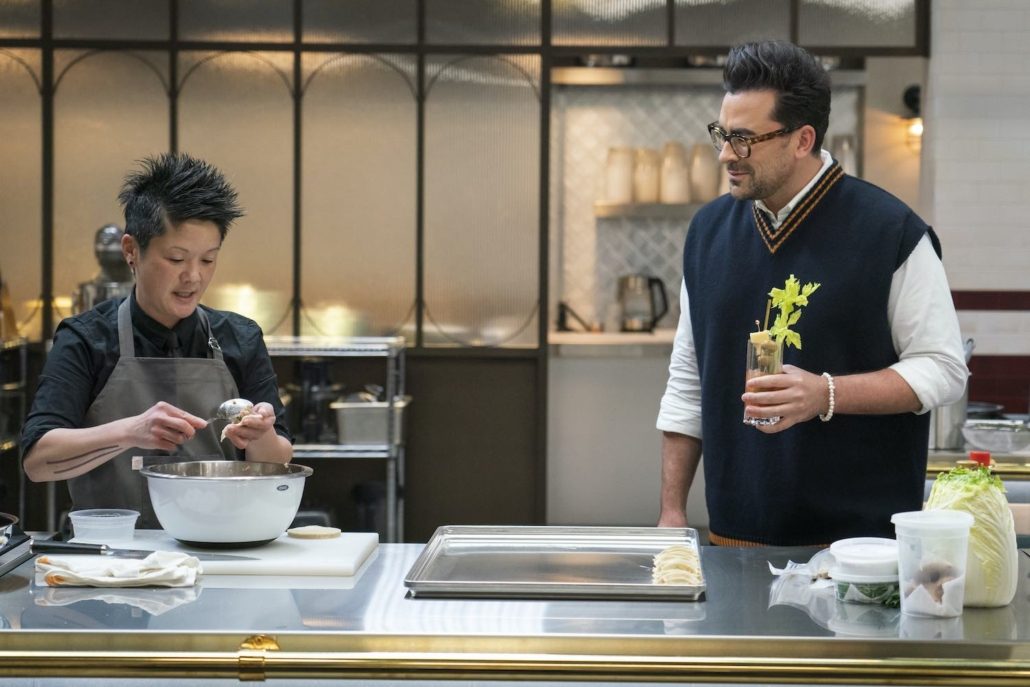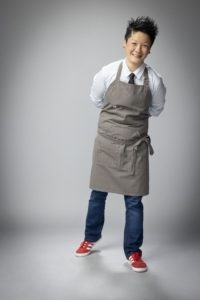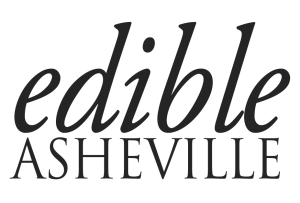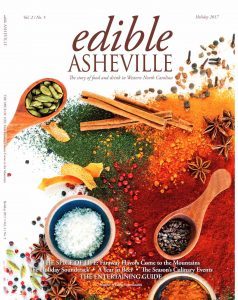COOKING FROM MEMORY
A Q&A with chef J Chong on Cantonese cuisine, community, and her role on the new HBO Max show The Big Brunch
BY GINA SMITH | PHOTOS PROVIDED BY HBO MAX
***
From her upbringing in a traditional Cantonese-speaking Chinese family in Toronto to a soccer scholarship at a Southern Baptist college in Mississippi where she first came out as queer, then swapping careers in her 30s from banking to cooking, J Chong’s life has been full of change and adaptation. In 2020, she left her position as sous chef at Cúrate to pursue her dream of cooking the Cantonese cuisine of her childhood.
Chong has since become a fixture in Asheville food scene, selling her popular dumplings and sauces at local tailgate markets and hosting sold-out pop-ups, but she couldn’t have imagined that her commitment to community and choice to stay true to her culinary roots would lead her to one day star in actor Dan Levy’s much-anticipated new HBO Max cooking show, The Big Brunch.
Streaming beginning Nov. 10, the eight-episode series features 10 community-minded chefs from all over the U.S. sharing their personal stories and business dreams while competing for a $300,000 cash prize. While Chong couldn’t share the outcome of the competition before the show aired, she talked candidly with Edible Asheville about the filming experience and her passion for Cantonese cooking.
Edible Asheville: What led to you being cast on The Big Brunch?
J Chong: I really enjoy telling this story when people ask me, because I really think it’s beautiful, genuine, and pretty comical. Our dental hygienist saw Dan Levy post it on his Instagram page. I think it’s funny because, you know, our dental hygienists, we go see them twice a year, and it’s an hour at a time, so I see this person two hours out of the year, and the whole time her hands are in my mouth, so it’s not like I can have a conversation and for this person to truly grasp who I am. But she obviously saw something, and she sent me his post, and she was just basically like, ‘Hey, J, I think you should apply for this.
You filmed the series in Los Angeles over the course of about a month last spring. What was that experience like?
We’ve all seen cooking competitions, but this one was just different. One reason, I think, is because it’s Dan Levy’s project, and he is exactly what you think he is when you see him on TV — he’s kind, he’s generous, and he’s thoughtful — and I think it made the experience that much better. And there’s the fact that he hand-picked all of us; he was extremely intentional with the people he wanted on the show, including the people in the background, like the production team. He curated a team that genuinely cares about the human experience.
For me, it was thrilling because I’ve never really been in that kind of environment. People ask me all the time if it was nerve-wracking to cook with cameras in my face, and I say no … that feels comfortable to me in a weird sense. But I think the hardest part was just reminding myself that it was OK to be vulnerable—because that’s what we need more of in this world—and just continuing to be true to myself and not alter because of everything else that was happening. You’re away from your family, you can’t tell anyone…. I couldn’t reach out to people besides, obviously, Danielle (Chong’s wife), so the lack of support system because of the situation was the tough part. We’re just so used to refilling with our loved ones. So, yeah, it was hard. But at the end of the day, my life is changed, so it’s all good.

What was one of the most memorable parts for you of filming the series?
Well, really just the whole experience—like, who really gets to shoot a series in L.A. with Dan Levy? So that alone was mind-blowing. I mean, here I am just this little Chinese kid from Toronto; who would have thought that would happen? But the people I met during this process, the nine other chefs and I, became so tight, we literally call each other family. That was such a beautiful thing to walk away from. It just speaks to what this show is going to convey to the world and what people are going to get from it.
At the end of the day, this is a food competition show, but because of the producers and who was behind it, it’s shot differently. It’s shot like more of a documentary, and that was Dan Levy’s intention. He wanted to bring these people together, people who are doing good in our communities to tell our stories. Because typically, people in our positions, our story is the food we put on the plate. Our personal side is never spoken about. And just meeting these people—I don’t know how to explain it—when you bring good people together, it just creates this ripple effect of goodness to put out in the world.
One of your great passions and part of what you’re doing on The Big Brunch is lifting up Cantonese cuisine and sharing those flavors with the world. Can you talk a little bit about what separates Cantonese cooking from other styles of Chinese or Asian cuisine?
Cantonese cuisine is pretty fresh and clean, not a lot of heat or spice like we would get from places like Vietnam or Thailand. It’s a lot of veggie-based dishes with proteins added if you wish. This food really stems from vegetables, then we build around that.
As far as techniques, all you really need is a high smoking point, oil, a wok, and great, fresh ingredients. Cantonese food is just so simple. I think that’s why I’m so passionate about introducing or re-introducing it to people, because people think Chinese is supposed to be cheap, saturated with sugar or corn syrup, and deep fried with some kind of bright-red sauce. That’s not what Cantonese food is to me; that’s not what I grew up eating. I grew up eating things like flank steak, thinly sliced, hard-seared in a wok with some vegetable oil or canola oil, and we would add a bunch of vegetables that we’d get from the garden, whether that be gai lan or yu-choy or bok choi or even green beans or eggplant. And we’d add sesame oil, soy sauce, ginger, and garlic — that’s what my culture’s mirepoix is. And those ingredients are pretty much the base of any dish. Once you have those, you’re good. And then you get into our ferments, like fermented black beans, and we use chili paste, soybean paste—we use ferments but not in a pickled sense.
You have a huge following in Asheville for your dumplings, of course, but what are a couple of other traditional Cantonese dishes that you really love?
Dumplings for sure. Another is congee, which is [also called] juk, and it’s just a rice porridge. It’s cheap and it goes a long way; it’s our poor people’s food. Every culture has at least one dish or grain that they can stretch, and it will feed the whole family, and that’s what congee is to me. Congee is extremely soothing and calming for me. We typically eat it when we’re sick because it soothes the stomach, and we can digest it. But for me, it’s kind of my love language. During the pandemic, whenever one of my friends was sick with COVID or whatever, I would deliver congee to their doorstep. Congee is so powerful because it’s healing internally, but it tastes so good and it’s something that goes way back, hundreds of years, this porridge that’s just rice and a liquid. So it’s powerful but also so simple.
Also, soy sauce chicken is one of my favorites. We slow-poach a whole chicken in a soy sauce water bath with star anise and cinnamon sticks and ginger. It’s slow-cooked and submerged in this liquid, so it’s so tender and moist on the inside. And the way it’s poached—you know how chicken skin, if it’s not fried, can kind of be slimy and not very appetizing? When we slow-poach it, it kind of seasons the skin where it has a little bit of crunch, but not like a potato chip crunch, just some texture to it that adds to the chicken. Then you serve it with the scallion-ginger-garlic sauce that I sell at the farmers market.
Congee and the soy sauce chicken—think about how simple those two things are, yet they’re just packed with flavor. That’s what I love about Cantonese food: You take simple ingredients, and the techniques or flavors you add to it just amplify whatever the ingredient is.
Where do you draw inspiration for your cooking?
I don’t have a relationship with my family, so cooking Cantonese food for me is my connection to my ethnicity. I don’t have any other connectors out there, so this is the one thing that I have left aside from me looking Chinese on the exterior; this is the one thing I have that is mine that reminds me of my ethnicity and where I came from. With a lot of the meals I cook and try to recreate, I may change the ingredients that are locally sourced here, but I try to respect the true tradition of Cantonese cuisine. Not a lot of people know what it tastes like, so I try not to veer too far off. Then once I serve it more, and more people have an idea of what the traditions are and how it’s supposed to taste, then I try to become creative with it and switch it up a little.
And I go off of memory. I didn’t have sessions in the kitchen where my family sat there and passed down recipes or taught me how to do things. It was just basically me standing in the kitchen and watching what was happening, because I did that often as a kid, just stood beside my family members and watched them cook. And a lot of the things I cook are just off of pure memory. I don’t have any notes or passed down recipes, it’s just pure memory and taste. For me, one of the next things I’d love to do is travel around Asia, but specifically China and just eat my way around. I’m not one of those people who can read a book and learn from it. I’m an active learner; I have to see things and do things and that’s how I learn. I can’t wait to get to China and learn more just by eating the food. But right now all the meals I cook and replicate are everything I grew up eating, and it’s solely off of memory.
You’re an outspoken advocate for the LGBTQ+ community and take a vocal stand against racism and hate. How does food fit into that part of your life?
Food brings us together. I can be with someone I totally disagree with and we can share a meal, and it’s somehow just going to bring us closer together. And eating a different type of food—for example, people here in Asheville who’ve never had Cantonese food—it gives them a little glimpse of what Chinese food is. Especially this past year or two when Asian Americans were getting a lot of shit in this country. It started with COVID when people were saying we brought COVID over, which was heart-wrenching, and then there was the abuse on Asian Americans. So if we eat other cultures’ foods, we can learn a little bit about them, then we can learn to be kind and respect them a little more. I think food is so powerful that it will do that, we just have to put ourselves out there and be willing to embrace it. And that’s what I think I’m supposed to be doing in this lifetime. Especially right now.
Back in 2020, when you decided to follow your dream of going it on your own to cook the cuisine you love, would you have imagined you’d be where you are today?
I never would have imagined that this would happen, and I never would have imagined that Asheville would be so super supportive of me. It’s such a beautiful thing. Asheville has truly, truly shown up for me, and it’s so overwhelming.
Follow J Chong on Instagram at @jchong_eats.
Save
Save
Save
Save
Save
Save
Save
Save
Save
Save

Chef J Chong appears on the new HBO Max series, The Big Brunch
THE WEEKLY REVEL
Sign up for your free handpicked guide to enjoying life around Asheville.
Available weekly from May to October.





